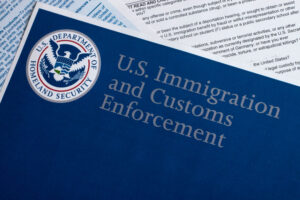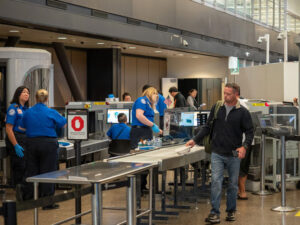 Careers in homeland security run the gamut from intelligence to emergency management to mission support to law enforcement. The events of 9-11 inspired a massive effort to build and restructure our nation’s homeland security efforts which, at the top, included the creation of the Department of Homeland Security (DHS).
Careers in homeland security run the gamut from intelligence to emergency management to mission support to law enforcement. The events of 9-11 inspired a massive effort to build and restructure our nation’s homeland security efforts which, at the top, included the creation of the Department of Homeland Security (DHS).
Today, the DHS, which is home to about 230,000 employees, serves as an umbrella agency that oversees 14 other federal agencies, including well-known organizations like U.S. Customs and Border Protection (CBP), U.S. Immigration and Customs Enforcement (ICE), the U.S. Secret Service (USS), and the Transportation Security Administration (TSA).
With this kind of massive reach, getting the training you need to become part of the DHS could mean having access to some really great career opportunities, and the earning potential within the department is just as impressive as you’d imagine.
Border Patrol Salaries with the U.S. Customs and Border Protection Agency
Homeland Security Salaries with ICE (U.S. Immigration and Customs Enforcement)
Homeland Security Jobs with the U.S. Secret Service
Transportation Security Administration (TSA) Officer Salaries
Salaries By State
- Alabama
- Alaska
- Arizona
- Arkansas
- California
- Colorado
- Connecticut
- Delaware
- District of Columbia
- Florida
- Georgia
- Hawaii
- Idaho
- Illinois
- Indiana
- Iowa
- Kansas
- Kentucky
- Louisiana
- Maine
- Maryland
- Massachusetts
- Michigan
- Minnesota
- Mississippi
- Missouri
- Montana
- Nebraska
- Nevada
- New Hampshire
- New Jersey
- New Mexico
- New York
- North Carolina
- North Dakota
- Ohio
- Oklahoma
- Oregon
- Pennsylvania
- Rhode Island
- South Carolina
- South Dakota
- Tennessee
- Texas
- Utah
- Vermont
- Virginia
- Washington
- West Virginia
- Wisconsin
- Wyoming
Border Patrol Salaries with the U.S. Customs and Border Protection Agency
 U.S. Customs and Border Protection (CBP) remains one of the world’s largest law enforcement agencies with more than 60,000 employees. The job of the CBP is two-fold: (1) to keep terrorists and their weapons out of the country; and (2) to facilitate lawful international travel and trade. The law enforcement professionals of the CBP are focused on border control and security (in the air and water and on the land), as well as customs and immigration enforcement, and agricultural protection.
U.S. Customs and Border Protection (CBP) remains one of the world’s largest law enforcement agencies with more than 60,000 employees. The job of the CBP is two-fold: (1) to keep terrorists and their weapons out of the country; and (2) to facilitate lawful international travel and trade. The law enforcement professionals of the CBP are focused on border control and security (in the air and water and on the land), as well as customs and immigration enforcement, and agricultural protection.
So, what can you earn by working in the CBP? Well, it depends on the role you assume within the agency:
U.S. Border Patrol
- Border Patrol Agent
Border patrol agents are focused on securing the nation’s international borders and coastal waters between all ports of entry.
Border Patrol agents with the CBP are paid using the Law Enforcement Officer (GL) pay table and are usually hired at the GL-7 level and qualify through specialized experience, a graduate degree, or a combination of the two, although depending on their previous education and experience, they may also be hired at the GL-9, GL-11, or GS-12 level.
As of June 2021, the base salaries for border patrol agents were:
- GL-7: $42,698
- GL-9: $47,619
- GS-11: $55,756
- GS -12: $66,829
But those are just base salaries. Border patrol agents typically earn an additional $24,000 – $38,000 annually in overtime, locality pay (based on various cost of living differences throughout the country), and premium pay (Sunday, holidays, and night shifts). This could mean that a border patrol agent at the GL-7 could realistically earn $70,000 – $80,000 annually.
At the GS-13 level and above (supervisory and executive positions), you’ll qualify for upper-level border patrol agent positions based on merit alone.
Office of Field Operations
- CBP Officer
CBP officers work at the nation’s 328 ports of entry and are responsible for border security, immigration, trade, and agriculture. CBP officers are paid on the General Schedule (GS), usually hired at the GS-5 level, and qualify through experience, a bachelor’s degree, or a combination of the two although, depending on their previous education and experience, may also qualify at the GS-7, GS-9, GS-11, or GS-12 level.
As of January 2021, the base salaries for CBP officers were:
- GS-5: $30,414
- GS-7: $37,674
- GS-9: $46,083
- GS-11: $55,756
- GS-12: $66,829
However, CBP officers earn, on average, $16,000 – $42,000 annually in overtime, locality pay (based on various cost of living differences), and premium pay (Sunday, holidays, and night shifts). As a result, a CBP officer at the GS-5 level could realistically earn about $45,000 – $70,000 annually.
At the GS-13 level and above (supervisory and executive positions), you’ll qualify for upper-level border patrol agent positions based on merit alone.
Certain duty locations throughout the U.S. may also come with extra pay incentives.
- Agricultural Specialist
Agricultural specialists ensure safe and legal trade and travel by preventing the introduction of harmful pests, foreign animal diseases, and potential agricultural-based bioterrorism into the country.
These specialists are usually hired at the GS-5 level and qualify by holding a bachelor’s degree or higher in a field related to the biological sciences. Candidates may also qualify by with at least 24 semester hours in biological sciences, agriculture, natural resource management, chemistry, or a related discipline and related work experience.
Agricultural specialists are paid on the GS Rest of the United States (RUS) law enforcement salary table which, as of January 2021, included the following salary base salaries:
- GS-5: $35,265
- GS-7: $43,683
- GS-9: $53,433
- GS-11: $64,649
- GS-12: $77,488
However, according to the CBP, agricultural specialists are eligible for up to $35,000 annually in overtime pay. Premium pay (Sundays, holidays, and nightshifts) can also add significantly to an agricultural specialist’s salary.
Air and Marine Operations
Officers within the CBP’s Air and Marine Operations division, who investigate criminal networks and restrict unlawful people or ships approaching our nation’s borders, air interdiction agents, aviation enforcement agents, and marine interdiction agents:
- Air Interdiction Agent
Air interdiction agents, who qualify as trained pilots, are paid on the General Schedule (GS) and usually hired at the GS-11, GS-12, or GS-13 levels which, as of January 2021, was:
- GS-11: $55,756 – $72,487
- GS-12: $66,829 – $86,881
- GS-13: $79,468 – $103,309
However, total compensation for air interdiction agents is actually significant more, as their annual pay includes an additional 35% Special Salary Rate and a 25% Law Enforcement Availability Pay. Other salary incentives include locality, overtime, and premium pay. As of 2020, the CBP reports that the average annual salary incentives for air interdiction agents totaled between $45,000 and $64,000, which resulted in salaries that ranged from about $100,000 for those at the GS-11 level to about $144,000 for those at the GS-13 level.
- Aviation Enforcement Agent
Aviation Enforcement Agents, who qualify with an FAA Medical Certificate Class II or above, are paid on the Law Enforcement Officer (GL) schedule and usually hired at the GL-5 level. As of January 2021, base salaries for aviation enforcement agents were:
- GL-5: $37,512
- GL-7: $42,698
- GL-9: $47,619
- GS-11: $55,756
- GS-12: $66,829
However, total compensation for aviation enforcement agents is usually much higher due to the addition of a 25% Law Enforcement Availability Pay and locality pay. As of 2020, the CBP reported that the average annual salary incentives for aviation enforcement agents were about $12,000 at the GL-5 level and $27,000 at the GS-12 level, which means that an aviation enforcement agent at the GL-5 level could realistically earn about $50,000 annually.
- Marine Interdiction Agent
Marine interdiction agents, who qualify with at least one year of specialized law enforcement experience and a valid U.S. Coast Guard vessel license, are paid on the Law Enforcement Officer (GL) schedule and are usually hired at the GL-9 level. As of January 2021, the base salaries for marine interdiction agents were:
- GL-9: $47,619
- GS-11: $55,756
- GS-12: $66,829
However, total compensation for marine interdiction agents is usually much higher due to the addition of a 25% Law Enforcement Availability Pay and locality pay. As of 2020, the CBP reported that the average annual salary incentives for marine interdiction agents were about $19,000 at the GL-9 level and $17,000 at the GS-12 level, which means that a marine interdiction agent at the GL-9 level could realistically earn about $66,000 annually.
- Detection Enforcement Officer
Detection enforcement officers, who qualify with specialized experience in areas like radar analysis and interpretation, knowledge of air traffic control procedures and terminology, and operational knowledge of airborne, maritime, and/or ground-based air traffic control, among others, are paid on the General Schedule (GS) and are usually hired at the GS-11 level which, as of January 2021, was $55,756. However, with overtime, locality, and premium pay considered, total compensation is about $15,000 more at the GS-11 level, according to the CBP.
Homeland Security Salaries with ICE (U.S. Immigration and Customs Enforcement)
 U.S. Immigration and Customs Enforcement (ICE) employs more than 20,000 law enforcement and support personnel. Homeland Security Investigations (HSI) remains the principle investigative arm of the DHS and is responsible for identifying and disrupting terrorist networks and transnational criminal organizations. About 10,000 employees work within the HSI and are assigned to its 250-plus offices across the country and in its more than 80 offices across the globe.
U.S. Immigration and Customs Enforcement (ICE) employs more than 20,000 law enforcement and support personnel. Homeland Security Investigations (HSI) remains the principle investigative arm of the DHS and is responsible for identifying and disrupting terrorist networks and transnational criminal organizations. About 10,000 employees work within the HSI and are assigned to its 250-plus offices across the country and in its more than 80 offices across the globe.
HSI criminal analysts, criminal investigators (often referred to as special agents), and technical enforcement officers gather evidence and build criminal cases against terrorists and those who facilitate terrorist networks.
Special agents with the HSI are paid are paid on the General Schedule (GS) and usually hired at the GS-5 or GS-7 level which, as of January 2021, was:
- GS-5: $30,414
- GS-7: $37,674
Significant overtime, locality pay (based on various cost of living differences), and premium pay (Sunday, holidays, and night shifts) often increase their annual salaries by $10,000 or more.
Homeland Security Jobs with the U.S. Secret Service
 The U.S. Secret Service (USS) is home to a highly skilled workforce with degrees in homeland security and related areas. Some of these positions include:
The U.S. Secret Service (USS) is home to a highly skilled workforce with degrees in homeland security and related areas. Some of these positions include:
- Special agents: Protect top U.S. and visiting foreign officials and investigate financial crimes. Special agents are paid on the Law Enforcement Officer schedule and are generally hired at the GL-7 to GL-9 level which, as of January, was $42,698 to $47,619.
- Uniformed Division officers: Protect facilities and venues for individuals protected by the USS. Uniformed Division officers are hired at the LE-01 level which, as of 2021, was $64,610 to $111,144.
- Technical Law Enforcement officers: Support special agents and Uniformed Division officers. Technical law enforcement officers are paid on the Law Enforcement Officer schedule and are generally hired at the GL-7 level which, as of January, was $42,698.
Transportation Security Administration (TSA) Officer Salaries
 The Transportation Security Administration is the federal agency that oversees the protection of our transportation systems. TSA careers include:
The Transportation Security Administration is the federal agency that oversees the protection of our transportation systems. TSA careers include:
- Transportation Security Officers (TSOs) are on the frontlines, screening passengers, baggage, and cargo.
- Law Enforcement/Federal Air Marshals (FAMs) work covertly on passenger flights worldwide.
TSA employees are paid using the TSA Compensation plan pay chart. As of 2020, TSOs earned a minimum salary of $24,334 – $36,558 and a maximum of $43,207 – $66,943. TSO managers earned a minimum salary of $43,207 – $66,943 and a maximum of $64,214 – $99,586, although overtime, locality pay, and premium pay can add significantly to a TSO’s annual salary.
January 2021 salary data for professions in the U.S. Customs and Border Patrol, U.S. Immigrations and Customs Enforcement, U.S. Secret Service, and the Transportation Security Administration. Figures represent national data, not school specific information. Conditions in your area may vary. Data accessed June 2021.




